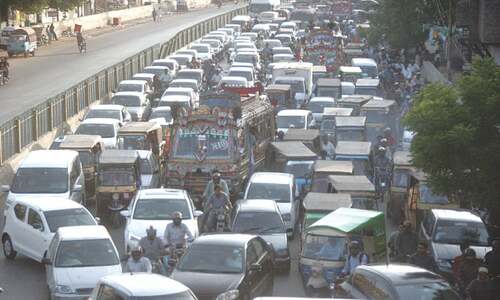KARACHI, May 14: Originated in England, the concept of justices of peace has evolved and developed over the past few centuries. It has been introduced in most countries to keep peace in certain areas through administrative and ministerial measures, but the justices’ role has gradually grown in some countries with the inclusion of a minor judicial role, with the power to try petty civil and criminal cases.
However, in Pakistan the role and powers of a justice of peace was reduced in 2006 on the grounds that the authority was mostly misused.
Earlier, a justice of peace had the power to make an arrest in circumstances enumerated in Sections 54 and 55 of the criminal procedure code and to hand over the custody of the arrested person to the officer in charge of the nearest police station.
He could call upon any member of the police force on duty to aid him in arresting or preventing the escape of a person involved in the commission of a cognizable offence and in prevention of breach of the peace or disturbances of the public tranquility.
He also had the power to issue a certificate of identification of a person, to verify documents and to attest any such document required by or under law in force to be attested by a magistrate, until the contrary was proved, any certificate, document attested shall be deemed to have been as fully attested as if he had been by a magistrate, as mentioned in Section 22-A of the CrPC.
However, the judicial powers of a justice of peace were delegated to sessions courts in 2006 through an amendment as most of the justices of peace had been found misusing their authorities. The powers of a justice of peace were limited to attesting documents and to resolving local disputes in collaboration with peace committees constituted under the Local Government Ordinance of 2001.
Legal experts said there was no criterion fixed for a justice of peace and licences were mostly granted on a political basis to people who usually did not have any idea about the law and importance of documentations, and they by misusing their powers tried to take action on political grounds and to make their influence in the area. Most of the justices of peace had also attested important documents without proper verification, which had resulted in rise in civil and property cases, they added.
They urged the authorities concerned to issue licences of justice of peace on merit instead of political affiliations, and make this process transparent in order to enable the justices of peace to play their due role in society.
A justice of peace, seeking anonymity, told Dawn that their powers had been reduced to attestation of documents and to resolving small disputes in their jurisdictions. He admitted that the justices of peace had misused their authorities to please their political groups and to become influential persons in their jurisdictions.
“There is no merit in becoming a justice of peace. The licences are mostly granted to political workers or their relatives on the directions of ruling parties,” he added.
The provincial home department issues licences to the justices of peace for performing their responsibilities in specified areas for a period of three years. The department could also cancel such licences if it found any justice of peace guilty of misconduct or misusing his authority.
Sindh Home Secretary Arif Ahmed Khan told Dawn that the department had recently withdrawn the notifications of appointment of three justices of peace in Karachi after he found them guilty of misusing their authority. He said the licences were issued in a hurry by the previous administration and now efforts were being made to make the process transparent.
Recently, a division bench of the Sindh High Court, comprising Justices Qaiser Iqbal and Mahmood Alam Rizvi, had summoned a justice of peace, Shahid Qureshi, for attesting a free-will affidavit of Sana, who had married Tehzir through court.
The court observed that under Section 22-A of the CrPC a justice of peace was not authorised to attest free-will affidavits.















































Dear visitor, the comments section is undergoing an overhaul and will return soon.